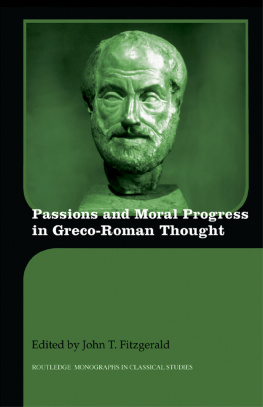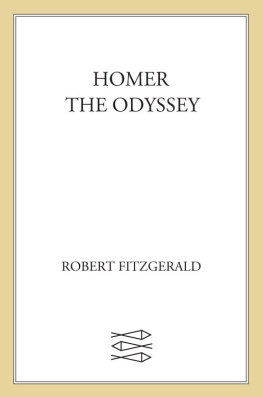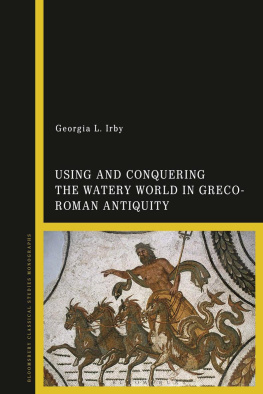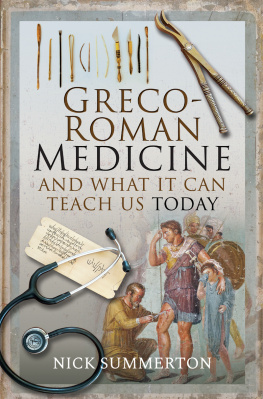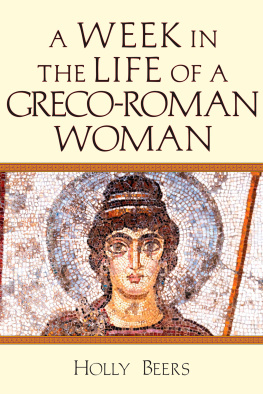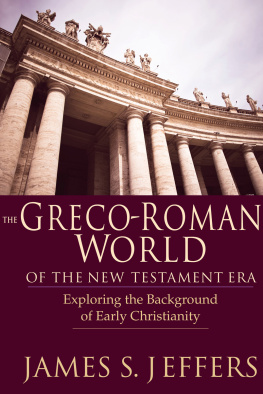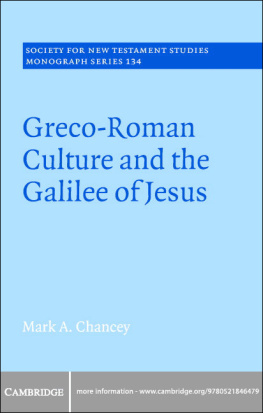Fitzgerald - Passions and Moral Progress in Greco-Roman Thought
Here you can read online Fitzgerald - Passions and Moral Progress in Greco-Roman Thought full text of the book (entire story) in english for free. Download pdf and epub, get meaning, cover and reviews about this ebook. City: London;New York, year: 2008, publisher: Taylor & Francis (CAM);Routledge, genre: Religion. Description of the work, (preface) as well as reviews are available. Best literature library LitArk.com created for fans of good reading and offers a wide selection of genres:
Romance novel
Science fiction
Adventure
Detective
Science
History
Home and family
Prose
Art
Politics
Computer
Non-fiction
Religion
Business
Children
Humor
Choose a favorite category and find really read worthwhile books. Enjoy immersion in the world of imagination, feel the emotions of the characters or learn something new for yourself, make an fascinating discovery.
- Book:Passions and Moral Progress in Greco-Roman Thought
- Author:
- Publisher:Taylor & Francis (CAM);Routledge
- Genre:
- Year:2008
- City:London;New York
- Rating:4 / 5
- Favourites:Add to favourites
- Your mark:
- 80
- 1
- 2
- 3
- 4
- 5
Passions and Moral Progress in Greco-Roman Thought: summary, description and annotation
We offer to read an annotation, description, summary or preface (depends on what the author of the book "Passions and Moral Progress in Greco-Roman Thought" wrote himself). If you haven't found the necessary information about the book — write in the comments, we will try to find it.
Passions and Moral Progress in Greco-Roman Thought — read online for free the complete book (whole text) full work
Below is the text of the book, divided by pages. System saving the place of the last page read, allows you to conveniently read the book "Passions and Moral Progress in Greco-Roman Thought" online for free, without having to search again every time where you left off. Put a bookmark, and you can go to the page where you finished reading at any time.
Font size:
Interval:
Bookmark:

PASSIONS AND MORAL PROGRESS IN GRECO-ROMAN THOUGHT
This book contains a collection of essays on the topic of the path andprokop, or the relationship between the passions and moral advancement in Greek and Roman thought. Recognizing that emotions played a key role in whether individuals lived happily, ancient philosophers extensively discussed the nature of the passions, showing how those who managed their emotions properly made moral progress.
The passions refer to those passionate emotions which can turn crucially destructive if left unchecked for example, unbridled anger, uncontrolled desire, or overwhelming grief. These essays explore the different Greco-Roman perspectives on the passions and moral progress and how they felt best to manage them to preserve and advance their own morality.
More comprehensive and multi-disciplinary than many other books on the subject, this book encompasses philosophy, literature, and religion, containing the efforts of thirteen leading specialists from various fields including classics, ancient philosophy and literature, Hellenistic Judaism, and New Testament scholarship. The contributions are preceded by a full and accessible introduction to the subject by John T. Fitzgerald.
Writers discussed include the Cynics, the Neopythagoreans, Aristotle, Theophrastus, Ovid, Paul, and Clement of Alexandria.
John T. Fitzgerald is Associate Professor of Religious Studies at the University of Miami. His research concentrates on the ways in which Jews and Christians interacted with Greco-Roman culture and appropriated philosophical materials for religious use.
PASSIONS AND MORAL PROGRESS IN GRECO-ROMAN THOUGHT
Edited by
John T. Fitzgerald

First published 2008
by Routledge
Published 2014 by Routledge
2 Park Square, Milton Park, Abingdon, Oxon OX14 4RN
Simultaneously published in the USA and Canada
by Routledge
711 Third Avenue, New York, NY, 10017, USA
Routledge is an imprint of the Taylor & Francis Group, an informa business
2008 John T. Fitzgerald for selection and editorial matter; individual chapters, their contributors
Typeset in Sabon by
Integra Software Services Pvt. Ltd, Pondicherry, India
All rights reserved. No part of this book may be reprinted or reproduced or utilised in any form or by any electronic, mechanical, or other means, now known or hereafter invented, including photocopying and recording, or in any information storage or retrieval system, without permission in writing from the publishers.
British Library Cataloguing in Publication Data
A catalogue record for this book is available from the British Library
Library of Congress Cataloging in Publication Data
Passions and moral progress in Greco-Roman thought / ed[ited
by] John T. Fitzgerald.
p. cm.
Includes bibliographical references and index.
1. Philosophy, Ancient. 2. EmotionsHistory. 3. EthicsHistory.
I. Fitzgerald, John T., 1948
B171.P37 2008
128.370938dc22
2007021588
ISBN 13: 978-0-415-28069-3 (hbk)
CONTENTS
JOHN T. FITZGERALD
WILLIAM W. FORTENBAUGH
DAVID E. AUNE
JOHAN C. THOM
DAVID ARMSTRONG
EDGAR M. KRENTZ
RICHARD A. WRIGHT
S. GEORGIA NUGENT
LOVEDAY C.A. ALEXANDER
DAVID WINSTON
DAVID CHARLES AUNE
TROELS ENGBERG-PEDERSEN
JAMES WARE
L. MICHAEL WHITE
Loveday C.A. Alexander is Professor of Biblical Studies at the University of Sheffield, Sheffield, England.
David Armstrong is Professor Emeritus of Classics at The University of Texas at Austin, Austin, Texas.
David Charles Aune is Associate Professor of Religion at Ashland University, Ashland, Ohio.
David E. Aune is Professor of New Testament and Christian Origins at the University of Notre Dame, Notre Dame, Indiana.
Troels Engberg-Pedersen is Professor of New Testament at the Section of Biblical Studies, Faculty of Theology, University of Copenhagen, Copenhagen, Denmark.
John T. Fitzgerald is Associate Professor of Religious Studies at the University of Miami, Coral Gables, Florida.
William W. Fortenbaugh is Professor Emeritus of Classics and Editor of Rutgers University Studies in Classical Humanities at Rutgers University, New Brunswick, New Jersey.
Edgar M. Krentz is Christ Seminary-Seminex Professor of New Testament, Emeritus, at the Lutheran School of Theology at Chicago, Chicago, Illinois.
S. Georgia Nugent is President of Kenyon College, Gambier, Ohio.
Johan C. Thom is Professor of Classics at the University of Stellenbosch, Stellenbosch, South Africa.
James Ware is Associate Professor of Religion at the University of Evansville, Evansville, Indiana.
L. Michael White is R.N. Smith Professor of Classics and Director, Institute for the Study of Antiquity and Christian Origins at The University of Texas at Austin, Austin, Texas.
David Winston is Professor Emeritus of Hellenistic and Judaic Studies at the Graduate Theological Union, Berkeley, California.
Richard A. Wright is Assistant Professor of Bible at Oklahoma Christian University, Oklahoma City, Oklahoma.
This volume has its origins in the work of the Hellenistic Moral Philosophy and Early Christianity Section, a program unit of the Society of Biblical Literature. From the outset the group has had an interdisciplinary character, comprising classicists, experts in ancient philosophy, specialists in Hellenistic Judaism, New Testament scholars, and others who are interested in early Christianity and the Greco-Roman world. Over the years we have investigated a number of texts, topics, techniques, and authors, and the results of our research have been published in one translation (Konstan et al. 1998) and in four previous collections of essays (Fitzgerald 1996; 1997; Fitzgerald, Olbricht, and White 2003; Fitzgerald, Obbink, and Holland 2004).
Our interest in the passions and moral progress was sparked not only by the widespread current interest in the emotions but also grew out of our work on friendship (philia) and frankness of speech (parrhsia). At an early stage in our research we discovered that there was a strong linkage in ancient thought between friendship and frank speech. Whereas the flatterer tended to lavish praise and to avoid criticism in his dealings with his friends, the true friend was willing to speak frankly to his companion when the latter merited candid criticism and could profit from it. In this regard the passions (path) were a chief area of concern. Individuals who were given to outbursts of anger, who could not control their desires, or who were paralyzed by grief over the death of a loved one were engaged in conduct that was self-destructive. Genuine friends could not sit idly by and let that happen to a person they cared about (compare the modern American slogan used in efforts to prevent driving while intoxicated: Friends dont let friends drive drunk). By speaking candidly to their angry or grieving companions, true friends hoped to persuade such individuals to cease from their ruinous behavior and thereby to improve the quality of their lives. Although those who used frank speech ran the risk of angering their friends and jeopardizing their relationship, their willingness to do so was crucial to their friends fulfilling their potential as people. Without self-control in regard to the passions, there could be no moral or spiritual progress (
Next pageFont size:
Interval:
Bookmark:
Similar books «Passions and Moral Progress in Greco-Roman Thought»
Look at similar books to Passions and Moral Progress in Greco-Roman Thought. We have selected literature similar in name and meaning in the hope of providing readers with more options to find new, interesting, not yet read works.
Discussion, reviews of the book Passions and Moral Progress in Greco-Roman Thought and just readers' own opinions. Leave your comments, write what you think about the work, its meaning or the main characters. Specify what exactly you liked and what you didn't like, and why you think so.

